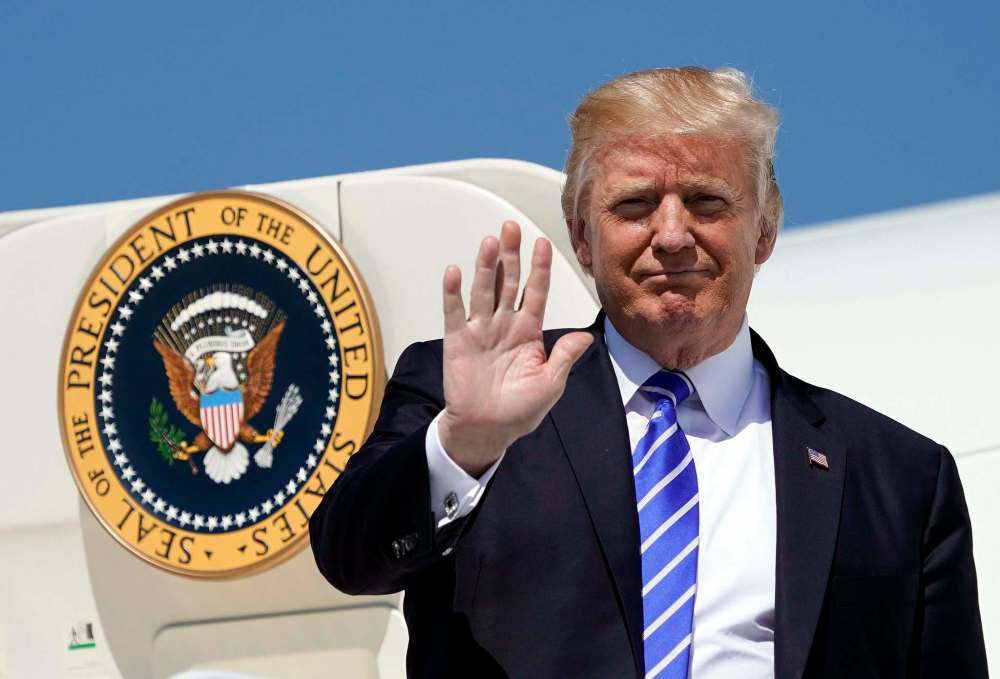For many, Trump’s appeal undiminished
Advertisement
Read this article for free:
or
Already have an account? Log in here »
To continue reading, please subscribe:
Monthly Digital Subscription
$0 for the first 4 weeks*
- Enjoy unlimited reading on winnipegfreepress.com
- Read the E-Edition, our digital replica newspaper
- Access News Break, our award-winning app
- Play interactive puzzles
*No charge for 4 weeks then price increases to the regular rate of $19.00 plus GST every four weeks. Offer available to new and qualified returning subscribers only. Cancel any time.
Monthly Digital Subscription
$4.75/week*
- Enjoy unlimited reading on winnipegfreepress.com
- Read the E-Edition, our digital replica newspaper
- Access News Break, our award-winning app
- Play interactive puzzles
*Billed as $19 plus GST every four weeks. Cancel any time.
To continue reading, please subscribe:
Add Free Press access to your Brandon Sun subscription for only an additional
$1 for the first 4 weeks*
*Your next subscription payment will increase by $1.00 and you will be charged $16.99 plus GST for four weeks. After four weeks, your payment will increase to $23.99 plus GST every four weeks.
Read unlimited articles for free today:
or
Already have an account? Log in here »
Hey there, time traveller!
This article was published 11/09/2017 (3013 days ago), so information in it may no longer be current.
Eight months into his tumultuous tenure as U.S. commander-in-chief, this much is certain about President Donald Trump: the people who loved him a lot last November don’t love him any less today.
That much was on full-throated display last week in North Dakota, where Mr. Trump made a quick stop to deliver one of the campaign-style addresses he continues to favour despite the electoral campaign having ended nearly 10 months ago.
The reason for his visit was a policy speech on energy, and the aptly chosen venue was an oil refinery in Mandan, a community that surely embraces Mr. Trump’s promise to reduce the number of environmental regulations that might impede wide-open capitalization of North Dakota’s recently exploited resource riches.

When the Free Press travelled south to observe the presidential occasion, what became immediately clear was that the northern state’s enthusiasm for Mr. Trump’s message and methods has not diminished. “He’s neither a Republican nor a Democrat — he’s a pragmatist,” said one POTUS-supporting entrepreneur who was selling Trump-adorned trinkets outside the event. “He’s here to solve a problem. He’s a true statesman.”
Almost more than any other state, North Dakota threw its support behind Mr. Trump in last November’s election, handing him 63 per cent of the state’s votes — the largest margin of victory in North Dakota since Republican Ronald Reagan’s rise to power in 1980. Despite the multiple controversies that have enveloped the Trump administration since he moved into the Oval Office in January — investigations of alleged collusion with Russians during the election, charges of massive conflicts-of-interest involving Trump-branded businesses, courtship and coddling of racist and neo-Nazi individuals and attitudes — Mr. Trump’s base of support, in North Dakota and throughout the United States, remains undeterred.
“I admire him so much. He’s a wonderful man. He’s fulfilling all the promises that he made to us,” said one senior in the throng gathered along the road to the Andeavor Corp. refinery, hoping to catch a glimpse of the presidential motorcade. “I respect his courage. He’s a wonderful person.”
For those inclined to criticize Mr. Trump for his obvious flaws and frequent misdeeds, this enduring admiration might be tough to fathom. But perhaps the key to understanding this most unusual of U.S. presidents lies not in who he is, but in what he isn’t: a politician.
After mounting a successful campaign built on the “Make America Great Again” promise (and, as a spinoff, profiting handsomely from the sale of Chinese-made hats bearing the slogan), Mr. Trump arrived in Washington with a pledge to “drain the swamp” — the swamp, of course, being the U.S. capital’s stuck-in-the-mud political culture.
Democrats and Republicans alike have been the targets of Mr. Trump’s vocal criticism and scornful tweets. Recently, it has been his own party’s congressional leadership that has frustrated the president most; last week, finally fed up with Republicans’ inability to deliver a win on any meaningful piece of legislation, Mr. Trump broke ranks and negotiated a deal with Democrats to raise America’s debt ceiling and prevent a government shutdown.
Not surprisingly, this caused great consternation among Republicans. In non-swampy places such as North Dakota, however, what much of Washington viewed as a political betrayal was greeted as a stroke of statesmanlike brilliance by a guy who, as one supporter observed, “sees a problem and says here’s how you solve it.”


